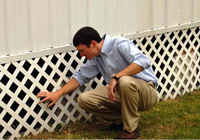IPM Education for Beekeepers: Battling the Chemo-centric Mindset
Project description and objectives:
Presently, Florida beekeepers deal with multiple pests that affect their colonies. The recommended treatments for these pests are largely chemo centric which by themselves may cause severe side effects. The cumulative effects of multiple pests invading the hive and chemical treatments used to control them are believed to contribute to Colony Collapse Disorder (CCD), the nation-wide phenomenon responsible for the disappearance of millions of honey bees. Despite beekeepers’ historic reliance on chemical treatments, a suite of non-chemical controls exist for use in bee colonies. The efficacy of these treatments (especially when integrated) is well documented scientifically but poorly adopted by beekeepers.
themselves may cause severe side effects. The cumulative effects of multiple pests invading the hive and chemical treatments used to control them are believed to contribute to Colony Collapse Disorder (CCD), the nation-wide phenomenon responsible for the disappearance of millions of honey bees. Despite beekeepers’ historic reliance on chemical treatments, a suite of non-chemical controls exist for use in bee colonies. The efficacy of these treatments (especially when integrated) is well documented scientifically but poorly adopted by beekeepers.
The international media attention given to CCD and the estimation that honey bees are responsible for 1/3 of the world’s food supply through pollination dictate a necessity for not only beekeeper education but accessible and public information about non-chemical IPM methods for combating CCD. Therefore we propose to create a free visual resource in the form of short IPM training videos tailored specifically for beekeepers but made available to the public through Solutions for Your Life, YouTube, and other video outlets. The videos will range from informational clips about honey bee pests to detailed instructions on how to treat these pests via IPM. We have already participated in a small pilot program in cooperation with the UF Genetics Department to produce several short videos. In the short time the videos have been online (posted on YouTube), they have been viewed nearly 1,200 times; this figure demonstrates the appropriateness of the proposed method of extension delivery.
Our objectives are:
1) To educate beekeepers with regard to controlling hive pests using proven IPM techniques (opposed to chemical
methods preferred by the industry).
2) Through IPM to significantly reduce chemical use in Florida bee colonies
as the bee industry is starved for more holistic control approaches.
Because CCD is an international phenomenon and the web-based platforms (such as YouTube) are viewed by millions, we believe that our videos will be used by beekeepers not only in Florida but across the nation and even the world. CCD has garnered heavy national media attention and the American public has become concerned and called for action to be taken to alleviate the effects of CCD. To that end, we believe our videos will educate the general public by communicating to them the depth of work being done by UF and others to address this important agricultural issue.
Because honey bees pollinate deciduous and small fruits and ensure as much as 1/3 of the world’s food supply, we all stand to benefit as beekeepers adopt more bee-, environmentally-, and human-friendly pest control techniques.
Click here to view an African Bee Presentation (25.4MB PowerPoint) - View as a slide show.
Frequently Asked Questions about the Africanized Honey Bee (36KB pdf) - M. O'Malley, J. Ellis, and A. Neal.
What to do about African Honey Bees: A Consumer Guide (37KB pdf) - M. O'Malley, J. Ellis, and A. Neal.
Bee-Proofing for Florida Residents (667KB pdf) - M. O'Malley, J. Ellis, and A. Neal.
Africanized Honey Bee Information for School Administrators (34KB pdf) - M. O'Malley, J. Ellis, and A. Neal.
Click here to view our 2006 IPM Florida Mini-Grant Project.
Project leaders:
Dr. Jaime Ellis, Assistant Professor of Entomology, Honey Bee Research and Extension Laboratory, UF/IFAS
Michael O'Malley, Extension Coordinator, Honey Bee Research and Extension Laboratory, UF/IFAS